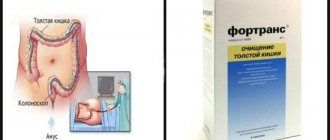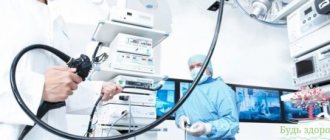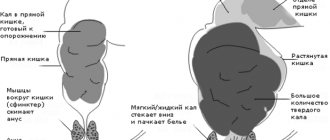The average person's intestinal tract contains an average of 3-8 kg of feces. These masses contain various bacteria, waste and all kinds of inclusions. The entry of fecal particles into various systems of the body outside the intestine is fraught with the development of sepsis and intoxication. Therefore, bowel cleansing before surgery on the gastrointestinal tract is a necessary procedure.
We will look at effective bowel cleansing methods indicated before surgery, including hemorrhoid removal.
Cleansing of the gastrointestinal tract is required to prevent the development of an infectious process, and for the convenience of the operation itself.
In the clinic, before the operation, the doctor advises the patient about the upcoming procedure and recommends a suitable method for cleaning the intestines from feces.
Depending on how extensive the operation is, cleansing using an enema, special medications, or hardware cleansing is possible.
Cleansing enemas
An enema is one of the simplest and most commonly used methods for removing feces. The procedure can be carried out either independently by the patient at home or by medical personnel in a medical facility.
In the photo: Esmarch's mug and the drug Fortrans
With the help of an enema, cleansing in the hospital is carried out as follows:
- In the evening, 12-16 hours before surgery, the first enema is given.
- 1.5-2 liters of warm boiled water is injected into the lower part of the large intestine.
- The second procedure is performed in the morning on the day of surgery.
Laparoscopy for colds
An important issue remains the presence of a cold on the eve of surgery. Can anesthesia be used for cold symptoms? Cough and runny nose must be cured. Inserting a tube into the trachea while coughing can cause respiratory failure and oxygen starvation of internal organs. With a prolonged lack of oxygen in the brain, the patient may not recover from anesthesia.
If the nasal passages are clogged with mucus, this will also interfere with anesthesia. For mild nasal congestion, vasoconstrictor drops should be used. To avoid getting sick before surgery, take care of your health. You can take medications to increase immune defense and strengthen the body's status.
Laparoscopy is considered a serious abdominal operation that requires preparation. Careful implementation of all recommendations will reduce the risk of complications during and after the operation. Dress according to the season to avoid getting rhinitis or another form of cold: a cough and runny nose will complicate the use of anesthesia.
Carrying out enema activities in a hospital setting is necessary for various reasons - before performing surgical operations, examining the abdominal organs, or helping a patient with stool problems after surgery.
Up to eight kilograms of fecal matter is constantly present in the human intestine. Feces contain pathogenic bacteria, waste, toxins, and other inclusions. If, during surgery, the contents of the intestine fall on neighboring organs, an inflammatory reaction develops to local infection and poisoning of tissues located nearby. Therefore, preliminary cleaning of the insides is a necessity.
The manipulation involves the introduction of a special solution into the canal of the large and rectal intestine. As a result of exposure to fluid, the contents of the organ are released and the intestine is cleansed. This method is cheap because the ingredients are available and inexpensive.
Cleaning products
Some patients have a negative attitude towards giving an enema. They can be replaced by a medicine to cleanse the intestines.
Laxative drugs are easy to use and safe for health. Such products are especially in demand for patients who have any pathologies in the rectum and anus: hemorrhoids, polyps, fissures, etc.
An intestinal cleanser can be produced in the form of tablets, syrups, water-soluble powders, and ready-made suspensions.
Depending on the mechanism of action, there are drugs that stimulate peristalsis, increase the volume of feces and dilute feces.
It is worth considering that the dosage of the medicine should only be determined by a specialist, taking into account the individual health characteristics of the patient and the nature of the upcoming operation.
Fortrans
The drug is produced by the pharmacological industry in the form of a powder for oral use. The product is sold in packages containing 4 sachets with the medicine. One portion of the medication should be dissolved in a liter of warm water.
Fortrans colon cleansing powder
The active substance of Fortrans does not enter the bloodstream from the stomach and does not affect other systems of the human body. The drug is excreted from the intestines with feces in the same form as it entered the gastrointestinal tract. Fortrans has a powerful laxative effect due to the active substance – macrogol. Once in the digestive tract, it swells and increases the volume of intestinal contents and stimulates peristalsis.
The drug is recommended for use before colonoscopy, irrigoscopy, MRI with the use of a contrast agent and various surgical interventions.
The product helps remove feces from all parts of the colon.
Duphalac
Duphalac is a lactulose-based laxative. Available in the form of a viscous yellowish syrup, ready for use. Duphalac is available in syrup form. To prepare for surgery, it is recommended to use about 100-150 ml of the drug . In most cases, doctors prescribe Duphalac as an adjuvant in combination with a cleansing enema.
The product stimulates peristalsis and softens feces, facilitating their easy removal. Duphalac has a hyperosmotic effect and helps increase the contents of the large intestine.
Fleet Phospho-soda
Solution for oral use with osmotic action. Available in 45 ml bottles.
The product is a saline laxative that increases the content of the intestinal lumen and softens feces. It should be taken for 2 days before surgery, immediately after breakfast.
While using Fleet Phospho-soda, you need to increase the amount of fluid you consume and follow a special diet prescribed by your doctor.
The medicine is used only to prepare for diagnostic or surgical intervention and is not used to treat constipation.
List of contraindications
Patients should find out the cost of laparoscopy in gynecology and prepare for it if:
- infertility, the cause of which has not been identified;
- chronic pain in the pelvic area;
- adhesive pathology;
- ectopic pregnancy;
- endometriosis;
- lack of positive results of hormonal therapy for infertility;
- cyst;
- internal bleeding;
- uterine fibroids;
- sclerocystosis, tumors or torsion of the ovaries;
- rupture of the fallopian tubes.
Preparation for the procedure will also be of interest to those patients who cannot make a diagnosis without a detailed examination of the pelvic organs using manipulative instruments.
Laparoscopy is not prescribed to patients in gynecology departments if:
- active course of acute infections in the body, especially in the pelvic organs;
- coma and shock states;
- attacks of bronchial asthma;
- serious pathologies of the nervous and cardiovascular systems;
- severe exhaustion;
- severe hypertension;
- difficulty breathing;
- diaphragm hernia.
Each listed contraindication is absolute. However, there are also relative limitations under which surgery in gynecology is possible. These include:
- tumor process in the cervix and ovaries;
- 2nd trimester of pregnancy;
- obesity 4th degree;
- active course of ARVI;
- excessive number of adhesions in the pelvic area;
- recent abdominal surgeries.
If there are relative contraindications and time, laparoscopy is performed after the condition improves.
Hardware colon cleansing
In some cases, removing feces from the rectum alone is not enough. Some operations require complete cleansing of the intestines from feces. In this case, resort to hardware action.
The procedure must be carried out by a specialist with constant monitoring of the patient’s condition.
If such a procedure is necessary, then bowel cleansing is carried out in a sanatorium or clinic.
There are also organizations that provide a similar service at the patient’s home, but it is not recommended to use it. The fact is that during hardware bowel cleansing, the patient may experience weakness, nausea and general discomfort caused by a decrease in blood pressure.
A small percentage of patients also develop pathological symptoms: shock, vomiting, sharp intense abdominal pain.
Therefore, during hardware cleaning, it is necessary to have equipment in the immediate vicinity to provide emergency medical care.
Features of recovery after surgery
After laparoscopy, the patient is left to regain consciousness in the operating room or taken to the ward. The decision is made by the doctor who performed the operation. Being in a conscious state, the patient gradually returns to active life. IVF doctors strongly recommend not to lie down after laparoscopy for more than 4 hours. Minimal physical activity helps normalize blood circulation.
How long should you be under medical supervision? If no serious consequences are identified, then about 3 days. After this, the patient regains her strength at home. You can return to your former life after a week after laparoscopy. However, physical activity must be limited! For about 2-3 weeks you should not carry heavy weights or perform exercises, especially those aimed at strengthening the abdominal muscles.
What is allowed to eat in gynecology departments after laparoscopy? Immediately after the operation - nothing. It is allowed to drink water without gas, it is advisable to refuse food altogether. On the second day, it is advisable to include in the menu only:
- broth from lean meats without vegetables, cereals, noodles and other things;
- tea without sugar.
https://www.youtube.com/watch?v=ytcreatorsru
On the 3rd day after laparoscopy, you are allowed to add to the daily diet:
- mashed potatoes;
- lean porridge;
- steam cutlets or meatballs;
- natural homemade yogurt.
Important! You can't break your diet! The intestines are located close to the genitals. It is unacceptable to complicate his work by consuming foods that cause gas formation. Discomfort in the abdomen will cause a lot of inconvenience and increase the recovery period.
Now about sex life after laparoscopy. The period of sexual rest is determined by the doctor, taking into account the purpose and result of the surgical intervention. In some cases, a ban on sex is imposed for 2-3 months - until complete rehabilitation. While the wounds are healing, the patient should not have any sexual intercourse.
In general, healing after laparoscopy is quite rapid. During the first few days, there is often constant pain in the abdomen and lower back. The consequences of laparoscopy quickly disappear without analgesics. You need to understand that the operation is over, which means that time is required for the body to recover.
When should I expect my period after surgery? It all depends on what period of the menstrual cycle the laparoscopy was performed. If for 7–10 days, then – at the usual time. In gynecology, a delay of 1–2 weeks is not uncommon. When the operation is performed in the middle of the cycle, menstruation comes in approximately 24–30 days.
Colonics
The procedure for cleansing the intestines in a clinical setting is called colon hydrotherapy or colonics:
- Cleansing is carried out using a special apparatus.
- A hose is inserted into the patient’s rectum, through which clean water or herbal infusion is supplied in portions to the digestive tract.
- The device for hydrocolotherapy is designed in such a way that the waste liquid is removed into a special reservoir.
- The manipulation continues for about 20-40 minutes.
The main advantage of the procedure is that it allows you to remove feces from all parts of the intestinal tract and minimize the risk of infection during surgery.
Hydrocolotherapy is a significant burden on the body, so it is carried out only if there are indications for this particular method of cleansing the intestines.
Clearing the digestive tract and intestines of feces is an important part of preparing for surgery.
The procedure can be carried out using pharmacological drugs, an enema or hardware techniques.
The most appropriate method of cleaning is determined by the doctor, based on the specifics of the upcoming surgical intervention and the individual health characteristics of the patient.
What is it prescribed for?
In addition to drugs and enemas, you can also use traditional medicine methods, but this will not work in a hospital.
You should not cleanse the day before or at home, as you may get an irreversible effect.
It is better to use the medications prescribed by your doctor or agree to an enema if you fail to follow the diet. In general, drugs and other means are prescribed for one purpose, so that there is no nausea from anesthesia on the operating table, peritonitis does not occur if suddenly an intervention is performed on the abdominal cavity, and the patient should not strain during bowel movements so that the sutures do not come apart.
https://youtu.be/CzuUKq_SgVg
Patient reviews
Yulia, Moscow: “They suggested doing colonics before surgery on the small intestine. I was very doubtful and worried, but it turned out that everything was happening very delicately. The conditions are comfortable, all materials are disposable. The process is unpleasant, but there is no painful sensation. But afterwards you feel clean and light. And the doctor praised me after the operation for having a clean intestine.”
Irma, Perm: “Before the operation, I took a laxative for quick cleansing. It works effectively, and you don’t need to go for an enema in the morning. But the taste is unpleasant, and drinking a whole liter of solution at a time is very difficult.”
Ilya, Ryazan: “I had polyps removed from my intestines. I took Fortrans. Very convenient, no awkward procedures in the enema room. I am glad that the doctor recommended this remedy to me.”
The procedure for preparing for laparoscopic cholecystectomy in a hospital
The first thing you need to do is warn your doctors about any allergies you have to any medications.
Before performing this operation, the anesthesiologist and surgeon must talk with the patient. During this conversation, specialists should tell the patient about the upcoming operation, the anesthesia used, and also inform him about the possible complications and consequences of gallbladder resection. In addition, the patient should be informed about the special regimen and diet that he will need to follow after cholecystectomy. The end of such a conversation is the patient signing consent for laparoscopic intervention and the use of general anesthesia.
It is best to begin preparing for gallbladder resection even before admission to the hospital. As a rule, it consists of following diet No. 5 and therapeutic exercises.











